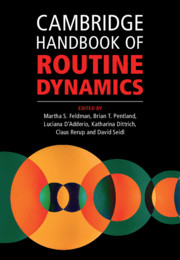Book contents
- Cambridge Handbook of Routine Dynamics
- Cambridge Handbook of Routine Dynamics
- Copyright page
- Contents
- Figures
- Tables
- Contributors
- Preface
- Chapter 1 What Is Routine Dynamics?
- Part I Theoretical Resources for Routine Dynamics Research
- Part II Methodological Issues in Routine Dynamics Research
- Part III Themes in Routine Dynamics Research
- Chapter 15 Truces and Routine Dynamics
- Chapter 16 Context, Embeddedness and Routine Dynamics
- Chapter 17 Routine Interdependence
- Chapter 18 Cognition and Routine Dynamics
- Chapter 19 Time, Temporality and History in Routine Dynamics
- Chapter 20 Replication and Routine Dynamics
- Chapter 21 Innovation Work and Routine Dynamics
- Chapter 22 Design and Routine Dynamics
- Chapter 23 Algorithms and Routine Dynamics
- Chapter 24 Complexity in Routine Dynamics
- Chapter 25 Bodies and Routine Dynamics
- Chapter 26 Emotions and Routine Dynamics
- Chapter 27 Professional Identity and Routine Dynamics
- Chapter 28 Occupations, Professions and Routine Dynamics
- Chapter 29 Routine Dynamics and Management Practice
- Chapter 30 Project-Based Temporary Organizing and Routine Dynamics
- Chapter 31 Self-Managed Forms of Organizing and Routine Dynamics
- Chapter 32 Unexpected Events and Routine Dynamics
- Part IV Related Communities of Thought
- Author Index
- Subject Index
- References
Chapter 31 - Self-Managed Forms of Organizing and Routine Dynamics
from Part III - Themes in Routine Dynamics Research
Published online by Cambridge University Press: 11 December 2021
- Cambridge Handbook of Routine Dynamics
- Cambridge Handbook of Routine Dynamics
- Copyright page
- Contents
- Figures
- Tables
- Contributors
- Preface
- Chapter 1 What Is Routine Dynamics?
- Part I Theoretical Resources for Routine Dynamics Research
- Part II Methodological Issues in Routine Dynamics Research
- Part III Themes in Routine Dynamics Research
- Chapter 15 Truces and Routine Dynamics
- Chapter 16 Context, Embeddedness and Routine Dynamics
- Chapter 17 Routine Interdependence
- Chapter 18 Cognition and Routine Dynamics
- Chapter 19 Time, Temporality and History in Routine Dynamics
- Chapter 20 Replication and Routine Dynamics
- Chapter 21 Innovation Work and Routine Dynamics
- Chapter 22 Design and Routine Dynamics
- Chapter 23 Algorithms and Routine Dynamics
- Chapter 24 Complexity in Routine Dynamics
- Chapter 25 Bodies and Routine Dynamics
- Chapter 26 Emotions and Routine Dynamics
- Chapter 27 Professional Identity and Routine Dynamics
- Chapter 28 Occupations, Professions and Routine Dynamics
- Chapter 29 Routine Dynamics and Management Practice
- Chapter 30 Project-Based Temporary Organizing and Routine Dynamics
- Chapter 31 Self-Managed Forms of Organizing and Routine Dynamics
- Chapter 32 Unexpected Events and Routine Dynamics
- Part IV Related Communities of Thought
- Author Index
- Subject Index
- References
Summary
How to organize work is a topic at the core of routine dynamics, and studying novel forms of organizing constitutes a prime occasion for theory development. Though self-managed forms of organizing (SMOs) have held perennial interest by scholars and practitioners alike, contemporary SMOs are larger, and more rule driven than their earlier counterparts. Our chapter offers a primer on contemporary SMOs and identifies key issues that a routine dynamics perspective can lend towards seeing, tracing and understanding contemporary SMOs.
Keywords
Information
- Type
- Chapter
- Information
- Cambridge Handbook of Routine Dynamics , pp. 421 - 432Publisher: Cambridge University PressPrint publication year: 2021
References
Accessibility standard: Unknown
Why this information is here
This section outlines the accessibility features of this content - including support for screen readers, full keyboard navigation and high-contrast display options. This may not be relevant for you.Accessibility Information
- 4
- Cited by
